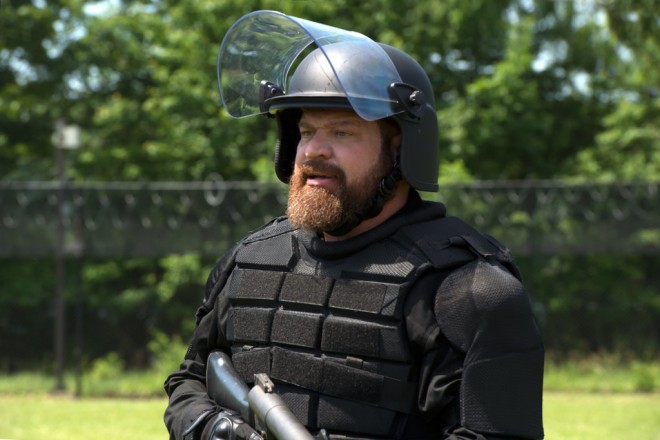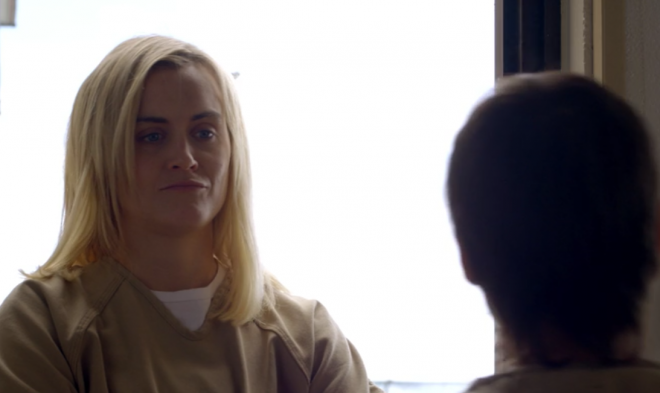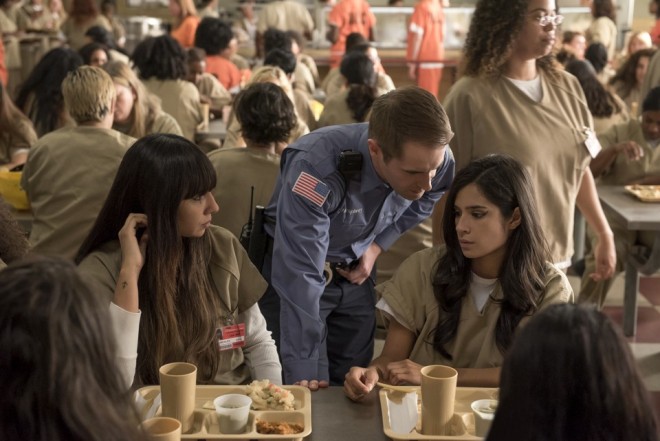Review: This Is The Most Devastating And Political Season Of ‘Orange Is The New Black’ Yet
Things have got much worse since Pornstache.
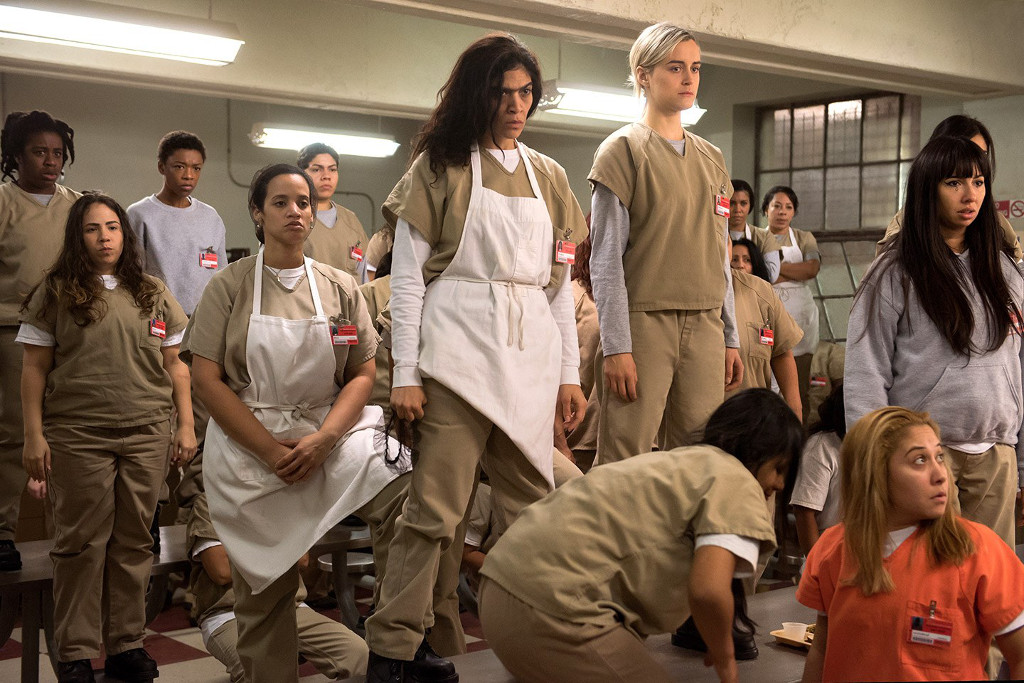
This is a review of the full new season of Orange Is The New Black. It contains SPOILERS.
–
Prior to the premiere of the fourth season of Orange Is The New Black which dropped on Netflix this weekend, Selenis Leyva (who plays Gloria Mendoza) told The Hollywood Reporter that racial tensions would heavily inform the latest batch of episodes. “This season is definitely going to start up conversations that we’re dealing with now,” she said. “[The writers] really take things that are happening, that are current events, and deal with topics that people are afraid to really dive into. We’re going to go there this season.”
Many of these topics have been ongoing: deaths in police custody, the unprecedented killing of trans women of colour, a militarised police force, #BlackLivesMatter, #SayHerName, #HandsUpDontShoot. But, in a month which has included the largest mass shooting in US history at an LGBT club, the ramifications of Brock Turner’s sentence, and the murder of British MP Jo Cox by an alleged white supremacist, the myriad parallels between Litchfield and the real world can be uncomfortably stark this season.
–
The Constant Spectre Of Violence
In the early reviews trickling out, the consensus seems to be that the first half of this season is weaker than the second. That being said, the first half does build an impressive sense of foreboding.
In stark contrast to the beautiful finale of the season three finale (in which inmates escaped to play in the lake), season four gets very real very quick. The mass walkout results in new guards (primarily army veterans) presided over by the ruthlessly authoritative C.O. Piscatella. They come bursting in from the maximum security prison down the hill in riot gear that puts remaining guards Coates and Bayley to shame. This is the first of many signs the show is drawing comparisons to an increasingly militarised US police force.
Following Lolly and Alex’s murder and dismemberment of drug kingpin Kubra’s henchman in the greenhouse, Lolly becomes obsessed with a drone she spies hovering over the yard. It turns out to be the result of paparazzi clamouring for a shot of the newly-incarcerated Judy King, but it nonetheless draws parallels with the use of drones in war zones and the surveilling of communities of colour.
When Caputo attends a convention called CorrectiCon (in Baltimore, of all places), the violence and indifference of the prison industrial complex is clear. Instead of taking advantage of the menstrual cups on display to alleviate the prison’s tampon problem, he (led by his companion, Linda from Purchasing at Litchfield’s corporate overlord MCC) seems more taken by laser gun demonstrations and goody bags containing foam batons.
The previously bumbling nature of the prison administration — which resulted in last season’s guard walk out and inmate escape — isn’t entirely lost amidst all this. As usual, poor, impotent Caputo has good intentions when he attempts to instigate an education initiative in the prison. But, under MCC’s strict budgetary guidelines, it results in what Caputo terms “a chain gang”. Considering the conflict brewing between various groups of prisoners through the rest of the season, this phrasing and its racial connotations is no mistake.
–
Latinas v Neo-Nazis
With the influx of new inmates at the end of last season, there is a sharp uptick in Litchfield’s Hispanic (particularly Dominican) presence; so much so that they are now the majority. It’s a move which makes a lot of sense considering this is the fastest growing real-world population in men and women’s prisons (the latter of which is only rivalled by Caucasians).
Inspired by her fiercely proud Dominican father (whom she rebelled against as a teenager), Maria Ruiz takes advantage of this and muscles in on Piper Chapman’s “prison pussy panty business”. In response, Piper forms Community Carers: a “taskforce” that aims to dismantle “gang” activity. Unfortunately for her, this is something the new, white supremacist inmates jump at the chance to join.
Piper’s selfishness and lack of self-awareness can always be depended upon to drive the story forward in this way. Her white privilege and cultural ignorance allows her to form what’s essentially a racist hate group angled at Maria and her Dominican sisters under the guise of protecting her business interests.
While the racist epithets they spew are micro-aggressive at best and triggering at worst, Sankey, Brandy, Skinhead Helen and the rest of their racist crew offer a teachable moment about ignorance and empathy. In episode nine, ‘Turn Table Turn’, one of the Aryans has the following moment of clarity:
“I don’t want anyone putting anything in my brain I didn’t give say so for… That’s how they get you: with words. They put ideas in the words that make you start thinking. And then all of a sudden you’re like, ‘what if other people are having these experiences that are different than mine but are still totally legit? And what if I’m supposed to think about that before I start judging their lives?’”
The neo-Nazis ultimately fail to overcome their prejudice, but it’s a clear argument against bigotry and prejudice for the real world. Always sketched along racial lines, Litchfield is a useful microcosm to explore these divisions and it was interesting to see them pushed to their extreme — even if it didn’t last.
–
Finding A Common Enemy
Sometimes a common hatred is more uniting than dissolving that hate. Enter: the guards. Litchfield’s new and old C.O.s become drunk with power; both literally, as they steal away into their new on-campus housing to get wasted while on duty, and figuratively.
As Piper’s task force makes Piscatella aware of “gang activity” perpetrated by a certain racial minority, Latina’s are stopped and frisked on a regular basis while white inmates breeze on by. At one point, C.O. Stratman makes Blanca stand on a table in the cafeteria without food, water or bathroom breaks as a form of torture until she breaks.
C.O. Humphrey proves to be the worst one of them all, eavesdropping on a conversation between Maritza and Flaca that later results in him forcing — at gunpoint — Maritza to choose between swallowing dead flies or a live baby mouse. During the lockdown, after the body parts of Alex and Lolly’s friend are unearthed in the garden, Humphrey instigates a fight between Suzanne and Maureen in a harrowing scene.
This is ultimately what leads to the will they/won’t they protest in the cafeteria in the penultimate episode. Representatives from each group — African-Americans, Latinas, racist whites, non-racist whites, and “the others” (those who don’t fit into the aforementioned categories) meet earlier in the day in an effort to get Piscatella and the other guards to resign but they don’t come to an agreement. Word gets around anyway and, led by Flaca, Piper and Taystee, the prison uprising begins with fatal consequences.
With the previous divisions within the prison, I’m not sure how believable their merger is at such a late juncture. But, the tragedy that follows and the eventual humanisation of villains such as Sankey — who concedes that some of the women of colour she meets with earlier are “actually nice ladies” — shows that sometimes you’ve got to put aside your differences for the greater good.
–
Black Lives (Don’t) Matter
If anything illustrates just how expertly OITNB hit the Black Lives Matter nail on the head, it’s the shocking death of Poussey during the dismantling of the protest by guards. Though it may have been an accident (as Caputo sells it to the media), her being crushed under the weight of C.O. Bayley is yet another example of black people dying in police custody. That Poussey’s body is left lying in the cafeteria for hours (in the same way Michael Brown was left in the street), and that Caputo declined to even #SayHerName during the press conference enrages Taystee, leading to the cliffhanger confrontation between guards and inmates that OITNB had been creeping towards throughout the whole season.
Further to this, Bayley is comforted by C.O. Dixon, who reveals that he murdered innocent civilians in Afghanistan for fun while still maintaining he’s a good guy. “We can’t let things like this fuck up the rest of our long lives,” Dixon says, echoing the words heard by nearly every young, white rapist from Steubenville to Stanford.
Then there’s Sophia, whose absence hovers large over the whole season. She remains locked in solitary confinement after being placed there “for her own protection” last season. MCC refuses to grant Sophia’s wife any information about her whereabouts or if she’s even alive because “the freedom of information act does not apply to privatised prisons” (thanks Lolly!). This heinous injustice is made all the worse when considering not only the real-world struggles of trans inmates, but the 64,000 missing women of colour and 14 trans women who’ve been murdered just this year.
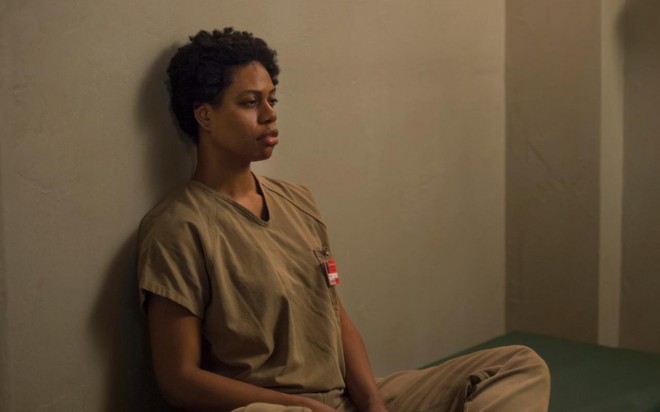
Laverne Cox has spoken about this at length.
Through the superb acting of Danielle Brooks (Taystee), Vicky Jeudy (Janae) and others, it’s hard to see Sophia’s treatment and Poussey’s death as anything but personal. But OITNB is arguably a TV show created with politics in mind.
Samira Wiley, who plays Poussey, spoke to Vulture about the cast’s reaction to her character’s death as a direct commentary on Black Lives Matter. “Our conversations on set will probably mirror a lot of people’s conversations in the world,” she said. “It wasn’t one, formal sit-down conversation we all had about it. It was a very organic conversation that hopefully now will spread to the rest of the audience that watches OITNB.”
“Some people who love the show don’t know what Black Lives Matter is. They don’t have a black friend and they don’t have a gay friend, but they know Poussey from TV and they feel like [they] knew her.”
So, while it feels like we’ve lost a friend through the (mostly racial) injustices they’ve chosen to portray this season, our response can be nothing but political. These issues have been in our timelines for years; at a point many switch out through ignorance or sheer exhaustion. It’s important that a show as influential as OITNB pick up the cause so we can’t turn away.
–
Season four of Orange Is The New Black is on Netflix now.
–
Scarlett Harris is a freelance writer and blogger at The Scarlett Woman. You can follow her on Twitter at @ScarlettEHarris.
